Are You Recycling Your Plastics the Right Way?
- On May 10, 2024 Read More

Doing so only not only helps conserve resources, energy, and landfill space, it can also help prevent pollution from contaminating our land and water. For example, electronic waste—even that from some of the emerging “green” technologies, such as photovoltaic panels—can contain heavy metals that are harmful to the environment if disposed of improperly.
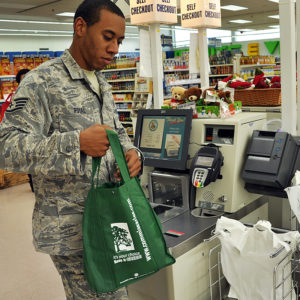
The most effective way to reduce waste is to not create it in the first place. Manufacturing a product requires energy and raw materials that typically must be extracted from the earth. Then, the product must be fabricated, packaged, and transported to market, which involves the expenditure of further energy and resources. Opting not to purchase goods that are unessential—or at a minimum choosing reusable bags/packaging to carry such purchases—helps reduce societal consumption of these materials, some of which are non-renewable. As a result, reduction is the most effective way to conserve natural resources, reduce waste, and protect the environment.

Reduction is fine—up to a point. But it can never bring consumption of resources, whether renewable or not, to zero. After reducing one’s consumption of materials/products, the next most effective way to conserve natural resources is to reuse them, where possible. Many everyday household items—for example, outgrown clothes or old computers—can be donated to charities or schools. This prolongs their useful life and means that the recipients of such goods avoid having to purchase new products.
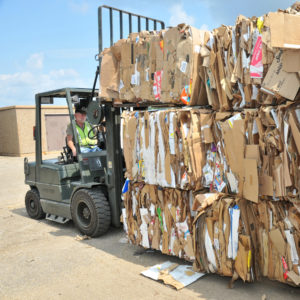
Many goods and materials can be recycled after use. Cans can be melted and fabricated into new containers. Industrial by-products such as coal ash can be repurposed as a substitute for cement, helping reduce the greenhouse gas emissions associated with concrete production. Auto batteries contain valuable recyclable materials, such as polypropylene, and others that are hazardous to the environment if disposed of carelessly, such as lead and sulfuric acid. Some materials in lead-acid batteries can be recycled to help manufacture new batteries, while others can be recycled for use in products such as laundry detergent, as well as in glass and textile manufacturing.
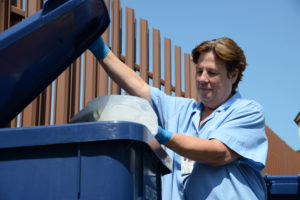 Municipal Solid Waste (MSW) comprises everyday items that are used, disposed of, and enter the waste stream, including product packaging, food scraps, clothing, furniture, appliances, and grass clippings. MSW does not include industrial, hazardous, or construction waste.
Municipal Solid Waste (MSW) comprises everyday items that are used, disposed of, and enter the waste stream, including product packaging, food scraps, clothing, furniture, appliances, and grass clippings. MSW does not include industrial, hazardous, or construction waste.
When a consumer (or school, hospital, or business) disposes of an item, it can be thrown in a trash bin or identified and separated out as recyclable. Items that enter the waste stream as trash are collected and taken by truck to transfer stations, where they are reloaded onto larger long-distance transport vehicles for shipment to landfills or other treatment or disposal facilities. Most of this waste stream ends up in landfills—engineered areas where waste is placed into the land—while a smaller portion is converted into usable heat, electricity, or fuel through a variety of processes collectively known as “waste to energy.”
Recycled items, meanwhile, are taken to a materials recovery facility that separates and prepares the materials for marketing to manufacturers for their reuse. Recycling items in this manner saves landfill space, conserves raw materials, and helps recoup some of the intrinsic value of the recycled items to provide “green” jobs for those who work in this industry.
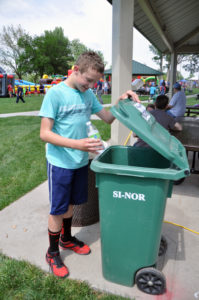 What you are permitted to recycle varies according to where you live. Contact your contracted curbside recycling company for details on what they will accept. Rules also vary by municipality and service provider as to how they will accept recyclables. Increasingly in the U.S., consumers are being allowed to put all of their recyclable items into one bin—known as single-stream recycling—for curbside collection.
What you are permitted to recycle varies according to where you live. Contact your contracted curbside recycling company for details on what they will accept. Rules also vary by municipality and service provider as to how they will accept recyclables. Increasingly in the U.S., consumers are being allowed to put all of their recyclable items into one bin—known as single-stream recycling—for curbside collection.
Hereafter are materials-related rules and information that pertain to most U.S. curbside recycling programs:
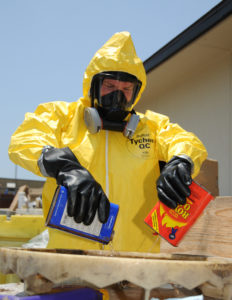 Some consumer waste commonly generated by households and businesses should not be thrown in the trash or recycled at the curbside. E-waste, batteries, fluorescent bulbs, paint, and motor oil can contain hazardous materials requiring special handling.
Some consumer waste commonly generated by households and businesses should not be thrown in the trash or recycled at the curbside. E-waste, batteries, fluorescent bulbs, paint, and motor oil can contain hazardous materials requiring special handling.